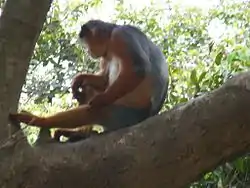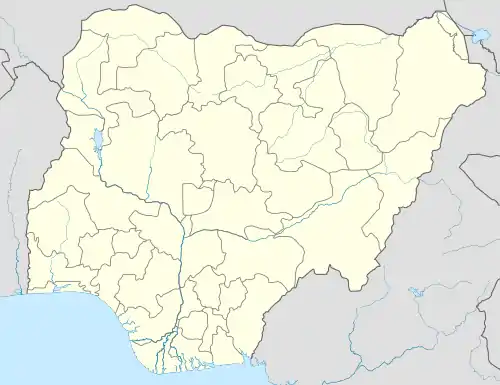Edumanom Forest Reserve
The Edumanom Forest Reserve is an area in the Niger Delta region of southeast Nigeria that is home to some of the last chimpanzees in Nigeria. It covers part of the old Nembe Kingdom, now divided into the Nembe and Brass local government areas, in Bayelsa State.
Edumanom Forest Reserve | |
|---|---|
Forest reserve | |
 Temminck's red colobus, Procolobus badius temminckii in Gambia | |
 Edumanom Forest Reserve | |
| Coordinates: 4°24′54″N 6°27′1″E | |
| Country | |
| State | Bayelsa State |
| Area | |
| • Total | 93.24 km2 (36.00 sq mi) |
The reserve is a freshwater swamp forest with an area of 9,324 hectares.[1] The habitat has been degraded by oil-industry and logging operations.[2] Although there are relatively few roads in the region, hunters can gain access to the forest through the creeks and along oil pipelines. The forest is also under threat from expansion of oil palm plantations. A proposed federal road from Ogbia to Nembe would run between two of the patches inhabited by chimps in the Edumanom forest.[3]
In 1995, hunter's reports suggested that there were 5-10 small chimpanzee groups in the general area, probably with no more than 50 individuals. Older hunters tended to avoid chimpanzees, but younger hunters boasted of killing them. Young chimps captured as a result of hunting typically are sold as pets or to zoos.[4] A June 2008 report noted that the reserve was the last known site for chimpanzees in the Niger Delta.[5]
The reserve also shelters the endemic Sclater's guenon and other IUCN Red List species olive colobus and Niger Delta red colobus.[5] The Sclater's monkey was considered vulnerable but not endangered in 2008. It is hunted throughout the area, except in a very few places where it is held sacred, and is managing to survive. A 2005 report recommended that it be protected within the Edumanom and other reserves in Nigeria.[6] There used to be red-capped mangabeys in the forest, but these are now thought to be extirpated.[2]
References
- "Forest Resource Situation Assessment of Nigeria... Forest Resources Management Plans and Maps". Beak Consultants. 1998.
- Lynne R. Baker1 and Oluseun S. Olubode (2008). "Correlates with the distribution and abundance of endangered Sclater's monkeys (Cercopithecus sclateri) in southern Nigeria". African Journal of Ecology. Blackwell Publishing Ltd, Afr. J. Ecol., 46, 365–373. 46 (3): 365. doi:10.1111/j.1365-2028.2007.00849.x.
- Rebecca Kormos; Christophe Boesch; Mohamed I. Bakarr; Thomas M. Butynski. "Status Survey and Conservation Action Plan: West African Chimpanzees" (PDF). IUCN. p. 129. Archived from the original (PDF) on 2009-11-16. Retrieved 2010-09-18.
- Rebecca Kormos (2003). West African chimpanzees: status survey and conservation action plan. IUCN. pp. 128–129. ISBN 2-8317-0733-1.
- "NIGERIA BIODIVERSITY AND TROPICAL FORESTRY ASSESSMENT" (PDF). USAID. June 2008. p. 76. Retrieved 2010-09-18.
- "Cercopithecus sclateri". IUCN Red List. IUCN. March 2010. Retrieved 2010-09-18.